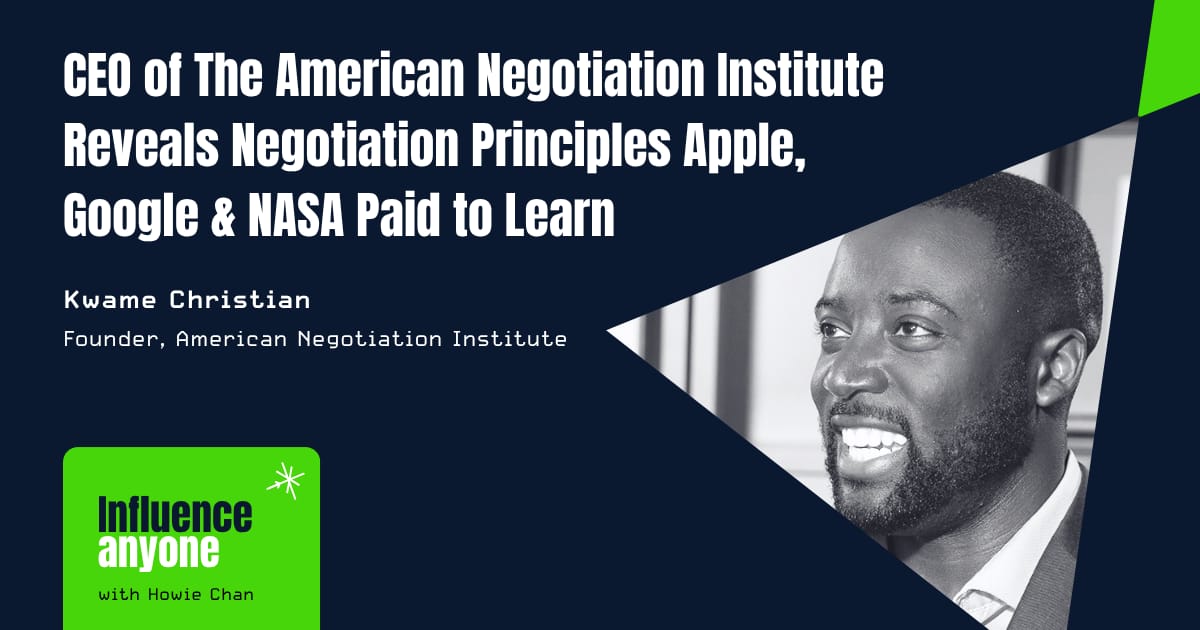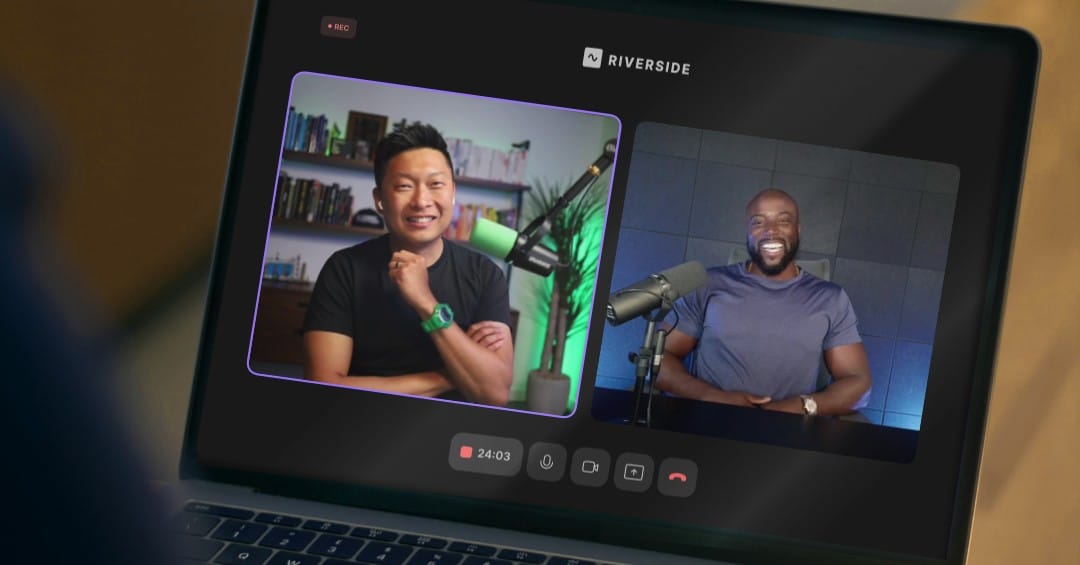Dear {{ first name | Legend}},
do you see yourself as a good negotiator?
Honestly I feel that I’m a terrible negotiator… why? Because I think being a good negotiator means having a heart of stone, someone who doesn’t get affected by big emotions and always knowing exactly what to say.
I’m certainly not that way.
But after I met with Kwame Christian, CEO and founder of the American Negotiation Institute and host of the Negotiate Anything podcast, he helped me see negotiation as something we all do and a natural part of life. (Watch a trailer of our conversation)
Negotiations doesn’t just happen in the boardroom.
You’re negotiating:
When your client pushes back
When your partner wants something different
When your kid asks for one more cookie
Disagreement = Negotiation.
And when we work and live with people, there is bound to be conflict. So think of times where you did get your way, where you managed to sway the other party to do something that benefits both of you.
I’m pretty sure you’ve done it. I have. So maybe I’m not that bad afterall.
But how can we be more consistent? What Iearned is that negotiation is all about managing psychology.
“You can’t send a message to someone who isn’t psychologically ready to receive it.”
🧠 Mindset: negotiations start first in our minds
The biggest problem anyone has in negotiating and navigating conflict is not the psychology of the other party, but our own. When we aren’t clear on what we want or we’re not in a state to think clearly, we fail.
So the playbook I’m about to give you has two sections:
Internal Game
External Practice
Ready? 👇🏽
🧰 Skillset: The Negotiate Anything Playbook
PART 1: The Internal Game
(Before the negotiation)
Most people lose negotiations before they begin.
Because they never got clear with themselves.
Kwame starts every negotiation by negotiating with himself.
Know what you really want, like REALLY
“You can be the best negotiator in the world and still lose. Because you negotiated for the wrong thing.”
Before any discussion or meeting, ask yourself:
What do I want?
Why do I want it?
Is this my want or something I absorbed from others?
(From a broad perspective, these are also great journaling prompts so we are fixated on what we truly want. I once talked to a CEO of an agency and she lamented the fact that she never really desired to be a CEO, the path appeared so she walked it.)
Understand the patterns that run you
Unfortunately, the truth is most people run scripts that run their life… subconsciously. The same patterns of outbursts, giving in, or settling for something they don’t want.
In order to break ourselves out of these patterns, we first have to recognized them.
“Most people don’t fix their mistakes. They just forget them.”
Kwame’s system to spot the patterns and take action against those that hurt him:
Use Apple voice notes to journal thoughts as they happen (the key here is to have a go-to method to capture thoughts constantly)
Most of us have our phones with us everywhere we go
Speaking is faster than typing
Convert monthly notes into MP3s to review them
If on Apple voice notes, just airdrop the files onto your Mac
Then import them using your Music app and add them to your playlist
What he tracks:
Emotional patterns
Decision outcomes
Triggers + timing (he retrained a negative 6–9pm emotional loop by first spotting the problem, then integrated a gratitude audio habit to break out of that loop)
This is the difference between guessing what’s wrong… and knowing exactly what needs fixing. This is the power of getting better at your internal game.
PART 2: The External Game
(During the negotiation)
This is where most people stumble: over-explaining, avoiding conflict, or getting defensive.
Kwame uses a simple but powerful approach called the:
Compassionate Curiosity Framework
Acknowledge emotion
What’s really important to understand here is that acknowledging their emotion is NOT the same as agreeing with their position or belief, but this first crucial step helps them lay down their psychological shield.
“This clearly matters a lot to you, I get that.”Get curious
Really seek to understand their position and their beliefs. Again, this is crucial to see how they think and what matters to them. You are NOT agreeing with them, you just need to get why.
“Help me understand what led to this?”Solve with the other person
Once you understand the lay of the land, psychological barriers are down, you can start to co-create a solution.“What would a win look like for both of us?”
A Real-Life Example: An Italian Restaurant in Jamaica
Kwame wanted a table at a half-empty restaurant without a reservation. He was denied at first.
Instead of arguing and being upset at why he and the family couldn’t get in, he said: “I understand the rule. But we’re leaving tomorrow, would it be possible just this once?”
No pressure. No demand. Just calm curiosity. “I listened. I asked twice. That was it.”
He got the table. The hostess felt good about helping a family out. This is the kind of influence and negotiations that happens everyday. Which means opportunities to practice negotiation and get better results is available to everyone of us at any time.
Negotiation isn’t about winning high pressure situations.
It’s about connection + co-creation with anyone we disagree with.
So, do you feel better about being a better negotiator? Were there times when you were able to get what you wanted and the other party did as well? Let’s make that a consistent occurrence, start internally, then externally.
If you like this, you’ll love:
10 Most Unfair Advantages in Negotiation (LinkedIn post and PDF resource)
How to Negotiate For More By Saying Less (6 shifts to get what you want without the other side losing)
How to Win Any Negotiation and Become a Master Communicator (strategies from a kidnap for ransom negotiator)
Change behavior, change lives 🤘🏽
Howie Chan
Creator of Influence Anyone
Don’t miss:

The Influence Anyone Podcast
IIn this conversation, Kwame Christian, one of the world’s leading negotiation experts shares how to turn conflict into connection using curiosity, clarity, and emotional control.
He breaks down the moment he replied to a white supremacist's hate email with empathy (and why it worked), the difference between being angry and experiencing anger (it changes everything), and how knowing when to sacrifice strategically can win you more than any counteroffer.

